 |
Objections
A Dispute over the Rainbow
 |
TIA,
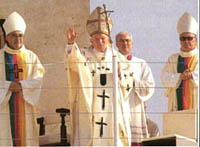
Above, rainbow vestments for Bishops - Inside the Vatican, October 1997.
Below, for priests - AFP
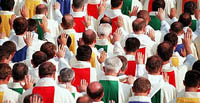
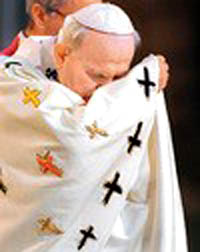
For the Pope the rainbow colors were in the crosses - Nevermind the Bricolage |
I have looked through your website and have seen many photo's which I could not possibly comment on.
There are a few though which you have made spurious claims about. Looking at the ones I do know about makes me question the opinions you have on other ones. If you can add 2 +2 and come up with 5 with some of the photos, then it cast doubts on your other works.
For instance you talk about a mass in France in which the chasubles have a rainbow pattern. You immediately associate that with the homosexual community. This maybe true of the US but when I visited the US in the 1990s I had to be told that the Rainbow flag represented the Homosexual community.
As a European the rainbow is the color of many different groups, e.g. a peace group which has Pace written across the flag, and secondly, the International Co-operative group which only recently changed its flag because of the American Homosexual flag.
It is true that nowadays the rainbow flag is being used in Europe but it has taken a while for it to be associated in peoples minds with Homosexuality.
This leads your comment on the chasubles to be wrong. In 1997 there was no connection with the rainbow and the Homosexuals in a European mind. And I would say that if you did a survey in Europe on the Rainbow you would still find many people associating it with many different groups. ….
Is mise le Meas
Fr. Gabriel Burke C.C., from Ireland

TIA responds:
Rev. Fr. Burke,
We are sorry we could not respond to your e-mail until now.
Your reasoning above can be summarized in this way:
- In Europe in 1997 the rainbow was not commonly known as a symbol of homosexuality;
- Therefore, the Bishops did not know about it;
- Consequently there is no relation between homosexuality and the rainbow-colored vestments the Bishops used at the WYD 1997;
- Hence, you concluded that TIA draws false conclusions regarding these photos;
- This leads you to presume that the same procedure is used in all of our other photos.
Let us follow this same sequence in order to give you a clear response.
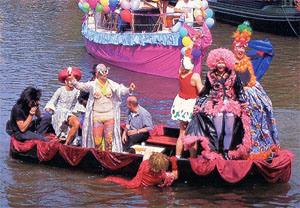
Amsterdam - 1997 - Algemeen Nieuws
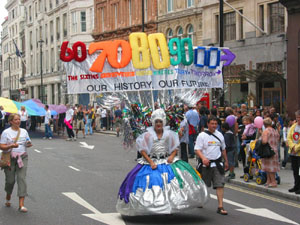
London - No date - Cheny
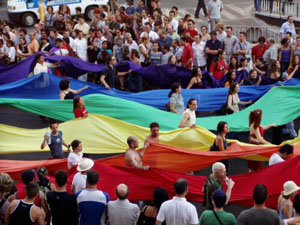
Madrid - No date - Wright |
1. It seems to us that your first premise is open to discussion. Indeed, the photo at right shows a gay parade in Amsterdam in 1997, pictured by Algemeen Nieuws online. You can observe that the rainbow colors are present on the ensemble. Other photos displayed at right below, which do not have a precise date, may also have taken place around that time.
You mention that you only became aware of the rainbow as a symbol of homosexuality when you visited the U.S. in the 1990s. Supposing that you regularly read newspapers and magazines, it is surprising that there were no reports in Ireland on the homosexual parades that were taking place all over the world during that time. In almost all other countries, the media broadly covers these events. Hence, any well-informed person knows, and would have known in 1997, that the rainbow is a homosexual symbol.
Further, those religious vestments for the WYD-1997 were not a product of the European mentality of the time, as you seem to surmise. They were ordered by the French Episcopate, with due approval of the Vatican, to be designed by the known French couturier Jean Charles Castelbajac. This man, an old hippy, is an avant-garde designer of fashionable clothes for women. It seems an extreme naïveté to suppose that he did know that the rainbow was a homosexual symbol. Asked why he designed those vestments with a rainbow motif, he said that it was “to not fit the mood of minimalism” that was dominating at the time (“Designer to the stars and Pope John Paul II,” The Guardian, January 20, 2006, online edition). An avant-garde couturier who wanted to be bold - this was the spirit of Castelbajac in designing those vestments. Can one presume that he would place on them a symbol that could open doors to homosexuality? We believe so.
2. Your second premise also seems faulty. In fact, Cardinals and Bishops are supposedly men who are well aware of the bad tendencies of their times. They have the duty to be aware of these things; otherwise they would be exposing their flocks to the enemy, and betraying their mission. Now then, homosexuality has been a major issue in the world and particularly in the clergy for at least 20 years. Therefore, in 1997 they must have known that the rainbow was a symbol of it. How can you seriously affirm that all these Prelates were unaware of it? Your supposition seems extremely unlikely.
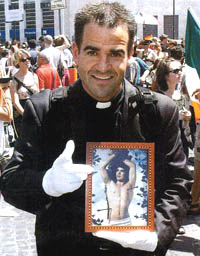
A homosexual priest in the Gay Parade, Rome, 2000 Actualite Religions, Sept. 2000 |
Even if the symbol of homosexuality were really unknown in Ireland as you say, the Prelates under discussion were Cardinals and Bishops of France, meeting in Paris, with a considerable number of them accompanying John Paul II from Rome, that is to say, two of the greatest cosmopolitan and well-informed centers of the world. How can you honestly imply that they would all be ignorant of that symbol? Doing so, you would be charging them with the same ignorance regarding books, newspapers, magazines and other media in which you seem to have enclosed yourself.
3. Since these two premises (1 and 2) are very weak, the result is that your first conclusion is unsustainable. It is not a necessary consequence of your shabby reasoning. It is arbitrary. In fact, it is most probable that the Pope, Cardinals, Bishops and priests who wore those vestments knew about that symbol and accepted it.
4. So, your condemnation of the TIA commentary is futile, as well as your condemnation extended to our other photos (5).
We are pleased that now you are starting to admit that in Europe this symbol is currently being used by homosexuals. To confirm this, we reproduce some photos of the so-called gay parades in many European countries. We call to your attention that these parades using the rainbow as a symbol are taking place all over the world, and not only in the U.S., as you still more aggressively affirmed in a previous message. This is why we are also reproducing here some photos of parades in other non-European countries showing that the rainbow is universally used as a homosexual symbol.
Cordially,
TIA correspondence desk
Posted August 23, 2006

Rainbow Used in Gay Parades in Europe

Above left, Dublin, 2004, Indymedia. Center, Paris, no date, Persovanado. Right, Reykjavik, 2004, Reykjavik
|

Above left, Budapest, 2004, Pestside. Center, Moscow, no date, MoscowNews. Right, Frankfurt, 2004, Gayweb
|

Above left, Turin, 2006, Edgeboston. Center, Milan, no date, Smileplease. Right, Warsaw, 2006, AP
|
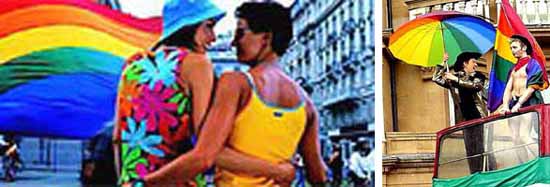
Above left, Vienna, no date, Infowien. Right, Dublin, 2004, Indymedia
|
Rainbow Used in Gay Parades around the World
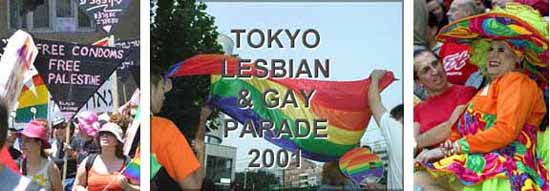
Above left, Jerusalem, 2002, SMH. Center, Tokyo, Phongfree. Right, Sidney, 2002, AFP
|

Above left, Toronto, no date, Fave. Center, Mexico, 2001, Mexcity. Right, San Salvador, 2002, Internet photo
|
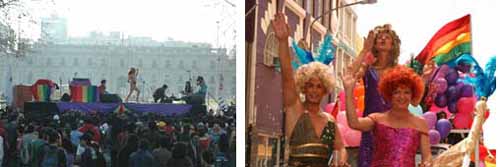
Above left, Santiago, Chile, 2006, Santiago Times. Right, Capetown, 2002, Jjphoto
|

Above left, Argentina, 2003, Latin. Center, Colombia, 2005, Rickey. Right, Brazil, 2006, Pinknews

|

Related Topics of Interest
 Bishops Wearing Rainbow Vestments at WYD-1997 Bishops Wearing Rainbow Vestments at WYD-1997
 Priests Take Part in a "Gay" Parade - New York City Priests Take Part in a "Gay" Parade - New York City
 A Feminine Looking Jesuit Performs a Hindu Dance A Feminine Looking Jesuit Performs a Hindu Dance
 Vice-Rector of Seminary Shown in Homosexual Behavior Vice-Rector of Seminary Shown in Homosexual Behavior
 Visit Our Page on Homosexuality in the Clergy Visit Our Page on Homosexuality in the Clergy
 Visit Our Page on Pedophilia in the Clergy Visit Our Page on Pedophilia in the Clergy

Objections | Questions | Comments | Home | Books | Tapes | Search | Contact Us

© 2002- Tradition in Action, Inc. All Rights Reserved
|
 |
| |

|